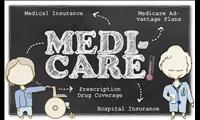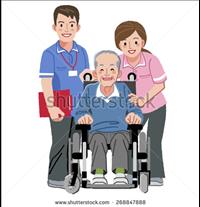|
Thursday, November 19, 2015
 Medicare Part B pays for doctor’s services, whether in their offices, the hospital, your home or other settings, and lab tests, screenings, medical equipment and other supplies. You will pay a monthly premium, which may be deducted from your Social Security, Railroad Retirement or Civil Service check. If the premiums are not deducted from your retirement or disability check, you will be required to pay premiums quarterly. In 2015, the monthly premium for most recipients was $104.90, though the premiums are higher if your annual income on your individual tax return is over $85,001 or on your joint return it was over $170,001. Read more . . .
Thursday, November 12, 2015
 Medicare Part A is known as hospital insurance. That term may be misleading, however, because services provided in the hospital by doctors, anesthetists, and surgeons are covered by Medicare Part B. Part A covers nursing care, such as care provided by professional nurses, a semi-private room, meals, lab tests, prescription drugs, medical appliances and supplies, rehabilitation therapy. Services provided for home health care, when you qualify, or hospice care are also covered under Part A. Generally, the Part A premiums are paid for by the Medicare taxes withheld from your paycheck if you or your spouse has worked enough to qualify for 40 or more work credits. Read more . . .
Thursday, August 6, 2015
 How do we decide how we want to be treated at the end of life? What would a good day look like if you were suffering from a terminal illness? This is one of the questions Dr. Atul Gawande asks in Being Mortal, Medicine and What Matters in the End, New York: Metropolitan Books, Henry Holt and Company, 2014, his book exploring medical treatment at the end of life. Dr. Gawande looks at how this one question, along with a series of questions most physicians are not asking their patients, might shape the course of medical treatment and care of those who are terminally ill, as well as those frail elderly who are in need of long term care. In the book, one patient says that he is willing to have medical treatment for his terminal illness so long as the treatment will allow him to eat ice cream and watch football on television. Read more . . .
Thursday, July 23, 2015
 July is SANDWICH GENERATION AWARENESS MONTH The Sandwich Generation refers to those caregivers, generally between the ages of 45 and 59, who are caring for aging parents while also caring for young children or dependent young adult children. One of the issues facing many of those caregivers is how to pay for the aging parent’s long-term care needs. Long-term care refers to ongoing assistance to meet some of the basic activities of daily living, such as bathing, eating, dressing, using the toilet, transferring from bed or chair, caring for incontinence or eating. The type and cost of long-term care depends on the services necessary for the health and safety of the person. Keep in mind that Medicare does not pay for long-term custodial care.
Read more . . .
Thursday, July 16, 2015
 July is Sandwich Generation Awareness Month. The Sandwich Generation refers to those people, mostly in their mid-40’s to late 50’s, who are caring for aging parents as well as caring for young children or dependent young adult children. If you are the meat or peanut butter in that sandwich, you might be looking for help from your siblings or other family members. One of the best ways to plan the care for an aging or disabled family member is by holding a family meeting. The meeting is designed to do many things: get information from the aging or disabled person about their needs, figure out what kind of care is needed and brainstorm about ways to find that care, gauge the financial resources available for care, and assign duties to various family members so that one caregiver does not get burned out. Read more . . .
Tuesday, July 1, 2014
Joe, an 89-year-old veteran served in WWII. He and his wife, Mary, have been living in an assisted living facility for three years and Joe has been receiving VA Pension with Special Monthly Pension for Aid and Attendance. Joe recently fell, and his physician has decided Joe cannot return to the assisted living facility. Joe is now in a Nursing Home and needs to apply for Medicaid to cover the cost of his care. VA Pension Benefits can be a lifesaver for veterans or their surviving spouses who need home care or assisted living facility care. Read more . . .
Monday, June 30, 2014
Steve, a veteran who receives service-connected compensation for ALS, amyotrophic lateral sclerosis, often known as Lou Gehrig’s disease, has trouble walking up the stairs and it is getting increasingly difficult for him to get in to the bathtub. His wife, Jane, can no longer lift him into the tub.
Steve may be eligible for a grant from the VA to adapt his house to accommodate his disability. The VA provides grants to Service members and Veterans who have total service-connected disabilities to help modify a home, purchase an already adapted home, build an adapted home on land already acquired, or pay down the unpaid principal on the mortgage of an adapted home the Service member or Veterans has already acquired.
There are two types of grants, with unfortunately similar acronyms: the Specially Adapted Housing (SAH) Grant, which provides up to $67,555 or the Special Housing Adaptation (SHA) Grant, which provides a maximum of $13,511 in 2014. Read more . . .
Friday, February 28, 2014
What is a Fiduciary and why does the VA want to appoint one for my dad?
George, a veteran of WWII who now lives in an assisted living facility, applied for Improved Pension with Aid & Attendance. After a few months, the VA sent him a letter explaining that George had been awarded the Pension, but would not receive his retroactive check until the VA determined whether he was competent to handle his affairs and whether the VA should appoint a fiduciary to manage his checks. What is a Fiduciary and why does the VA want to appoint one for my dad?
George, a veteran of WWII who now lives in an assisted living facility, applied for Improved Pension with Aid & Attendance. After a few months, the VA sent him a letter explaining that George had been awarded the Pension, but would not receive his retroactive check until the VA determined whether he was competent to handle his affairs and whether the VA should appoint a fiduciary to manage his checks.
Often veterans or their surviving spouses applying for VA Pension or Compensation benefits have some mental disease or injury that affects their ability to manage their financial affairs. Read more . . .
Wednesday, February 19, 2014
What happens to my Facebook page after I die?
A few weeks ago, I received a request to send a birthday greeting to a deceased Facebook friend. This friend has been dead for several years now, but her Facebook page remains active. While I feel happy to be reminded of her every year, it feels a little creepy to be asked to wish her a happy birthday.
Have you ever thought about what happens to your "digital assets" after your death? Who can read your e-mails after your death? How will someone pay the online bills if you are incapacitated? Who gets your iTunes or Kindle books?
What if you have an online store or an e-bay or PayPal account that is worth some money? Will anyone even know what accounts you have?
There is no legal definition of "digital assets", so for the purposes of this article we will say that digital assets are files that are stored on a person's computer or on a server, and online accounts.
We can divide digital assets into five categories:
- Devices and data, such as computers, iPhones and the documents stored on them
- Electronic mail, including message received and continued access
- Online accounts which require usernames and passwords
- Financial accounts which are usually linked directly to banking and other financial institutions
- Online business, such as online stores and blogs which may have the potential for streams of revenue
Traditional laws regarding ownership, and agency and probate laws generally dictate the rules about control of assets during life and the disposition of property at death. Read more . . .
Monday, February 17, 2014
Unreimbursed Medical Expenses
The VA terminology is confusing, to say the least. We’ve discussed what a Pension is, but you may be wondering how the VA figures out Income for VA Purposes, or IVAP.
The definition of IVAP means all of the income received by the individual applying for the benefit, and all of the income of the spouse as well. That income may include Social Security, Pension, mandatory IRA distributions, annuity payments, and interest income. This list is not exhaustive, but basically any money that the veteran, spouse, or surviving spouse receive may be considered income. However, for IVAP purposes, the term income actually means all the money received, minus unreimbursed medical expenses – or “UME’s” in VA-speak. In other words, medical expenses that are not paid for by insurance, Medicare, long-term care insurance, or another program or party may be considered to be unreimbursed medical expenses.
So what kinds of expenses are unreimbursed medical expense?
The answer, like the answer to so many other legal questions is, that depends.
If the veteran, spouse, or surviving spouse is in a nursing home or an assisted living that provides custodial care and assistance with the activities of daily living, the room and board at the facility may be considered to be an unreimbursed medical expense.
A recent “fast letter” issued by the VA outlines the circumstances under which the room and board may be deducted from income. The letter, which is an explanation to those VA employees trying to determine which medical expenses qualify, states that
“The cost of room and board at a residential facility is a UME if the facility provides custodial care to the individual, or the individual’s physician states in writing that the claimant must reside in that facility to separately contract for custodial care with a third-party provider.
A facility provides custodial care if it assists the individual with two or more ADL’s.
If the facility does not provide the claimant custodial care, or the claimant’s physician does not prescribe care by a third-party provider in that facility, VA will not deduct the cost of any medical or nursing services obtained from a third-party provider.
So you can see that if a claimant is deficient in Activities of Daily Living (ADL’s), and the facility provides assistance with those ADL’s, the money paid for rent and food at the facility will be deducted from the income. If, however, the claimant is at facility that is better characterized as an independent living facility, and the claimant is only there because they need assistance with meal preparation and transportation, the room and board will not be considered to be a medical expense and cannot be counted to offset income.
Can room and board ever be considered as a UME if the resident is in an Independent Living Facility? If a physician prescribes third-party custodial care that can only be provided in the facility, the room and board can be used as a medical expense. Most ILF’s contract with home-care companies to provide assistance with ADL’s to their residents. The facilities themselves are not licensed to provide such care, so they make arrangements with other companies to send their employees in to provide the care.
So, in addition to room and board, what other medical expenses can be deducted?
For an initial application, the VA considers what they characterize as prospective, recurring expenses that are likely to continue for the twelve months following the initial application. Home care provided by an in-home attendant may be deducted from income if the veteran or spouse has been rated as housebound or in need of Aid & Attendance. In that case, the attendant need not be a licensed healthcare professional. If the veteran or spouse has not been rated as housebound or in need of the Aid & Attendance of another person, the in-home attendant must be a licensed healthcare professional in order for the expenses to count as unreimbursed.
The VA considers health or hospitalization insurance premiums for both the veteran and the spouse to be unreimbursed medical expenses. The monthly Medicare insurance premiums deducted from Social Security are considered unreimbursed medical expenses.
For the most part, the VA does not count payment for prescription medications as unreimbursed medical expenses on the initial application. However, prescription expenses may be claimed as additional expenses after the first year.
Thursday, February 13, 2014
Who is a spouse for VA benefit purposes?
The United States Code and the Code of Federal Regulations – the rulebook for the VA – state that a spouse is a person of the opposite sex, whose marriage meets the requirements of the state in which the parties resided at the time of the marriage. [1]
The Supreme Court recently struck down a provision in the Defense of Marriage Act that stated that for federal purposes, a marriage between members of the same gender could not be valid. Why did the Supreme Court strike this down? Primarily because marriage has historically been a state law question. In other words, each state has defined the rules for marriage as that state sees fit. Read more . . .
The Elrod-Hill Law Firm,LLC assists clients with Estate Planning, Veterans Benefits, Medicaid, Elder Care Law, Probate, Special Needs Planning and Pet Trusts in the North Atlanta area including the counties of Dekalb, Gwinnett and Fulton.
|

|
|
|